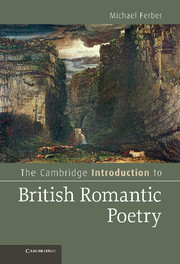Book contents
- Frontmatter
- Contents
- Preface
- Acknowledgments
- Chapter 1 Introduction
- Chapter 2 The poet
- Chapter 3 “Tintern Abbey”
- Chapter 4 Romantic odes
- Chapter 5 The French Revolution
- Chapter 6 Romantic sonnets
- Chapter 7 Romantic love lyrics
- Chapter 8 Romantic ballads
- Chapter 9 Romantic epics and romances
- Chapter 10 Romantic verse drama
- Chapter 11 Romantic satire
- Appendix
- Notes
- Further reading
- Index
Chapter 10 - Romantic verse drama
Published online by Cambridge University Press: 05 June 2012
- Frontmatter
- Contents
- Preface
- Acknowledgments
- Chapter 1 Introduction
- Chapter 2 The poet
- Chapter 3 “Tintern Abbey”
- Chapter 4 Romantic odes
- Chapter 5 The French Revolution
- Chapter 6 Romantic sonnets
- Chapter 7 Romantic love lyrics
- Chapter 8 Romantic ballads
- Chapter 9 Romantic epics and romances
- Chapter 10 Romantic verse drama
- Chapter 11 Romantic satire
- Appendix
- Notes
- Further reading
- Index
Summary
Though comedies and tragedies were performed in several London theaters every night during the era of Romanticism, as well as in many other British cities, and audiences filled them with passionate applause or catcalls and eagerly read reviews of them in the newspapers, the prevalent view today is that the era was a low point in the history of British drama. Nothing from that time is still mounted on stage unless it is a revival by students at universities. Certain actors and actresses – Kemble, Kean, Siddons – are still remembered, but mainly for their roles in Shakespeare; the fact that they sometimes made temporary successes of new plays attests more to their skill or charisma than to the merits of the plays themselves, now forgotten.
The Romantic temperament, moreover, is often said to be antithetical to theatrical expression or extroversion. Not for nothing was Hamlet seen as the most “Romantic” Shakespearean character: his long soliloquies, his dialogues with a ghost, and his overly articulated hesitations and dilemmas drew him to the hearts of audiences and readers and made them forget that he is in fact very active and violent. Indeed there was a tendency to prefer reading Shakespeare privately to watching his plays on stage. Charles Lamb, in an essay “On the Tragedies of Shakespeare, Considered with Reference to their Fitness for Stage-Representation” (1818), went so far as to say that Shakespeare’s “absolute mastery over the heart and soul of man” has no connection with “those low tricks upon the eye and ear” an actor performs, and that “the plays of Shakespeare are less calculated for performances on a stage, than those of almost any other dramatist whatever.” If that judgment seems bizarre, it seems true of plays written by the Romantics themselves that they are best suited for reading, either silently alone or aloud among a circle of friends. Jerome McGann has recently argued that “The separation of the drama from the theatre is an index of Romanticism itself.” We might see this separation as a product of the “lyricization” of drama, as of the other genres, that I have discussed earlier.
- Type
- Chapter
- Information
- The Cambridge Introduction to British Romantic Poetry , pp. 191 - 206Publisher: Cambridge University PressPrint publication year: 2012

